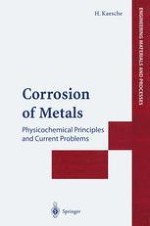2003 | OriginalPaper | Chapter
Adsorption Inhibitors of Acid Iron Corrosion
Author : Prof. em. Dr. rer. nat. Helmut Kaesche
Published in: Corrosion of Metals
Publisher: Springer Berlin Heidelberg
Included in: Professional Book Archive
Activate our intelligent search to find suitable subject content or patents.
Select sections of text to find matching patents with Artificial Intelligence. powered by
Select sections of text to find additional relevant content using AI-assisted search. powered by
By definition, corrosion inhibitors are soluble substances which, added to the aggressive solution, reduce the corrosion rate without participating in the overall reaction. As they are not reactants in the overall corrosion reaction they are negative catalysts. In this chapter we shall not deal with inhibitors such as sodium carbonate, or other substances increasing the pH of the solution and favoring spontaneous passivation, or hydrazine as a reagent reducing dissolved oxygen and thus removing the aggressive species in many neutral-solution corrosion processes. Also, we shall disregard inhibitors as components of protective paint systems, such as the classical read lead oxide, Pb3O4, an intensely oxidizing species again aiming at passivating iron and steel surfaces. Instead, the object will presently be the mechanism of corrosion protection by inhibitors of acid corrosion acting through adsorption on the metal surface from a solution containing the inhibitive substance in millimolar or even smaller concentration only. The typical industrial application of adsorption inhibitors is protection of hot-rolled steel against heavy metal loss by corrosion during acid pickling. Another important application is protection of underground gas and oil well piping against corrosion and accompanying embrittlement by attack by underground acid hydrogen sulfide solutions.
